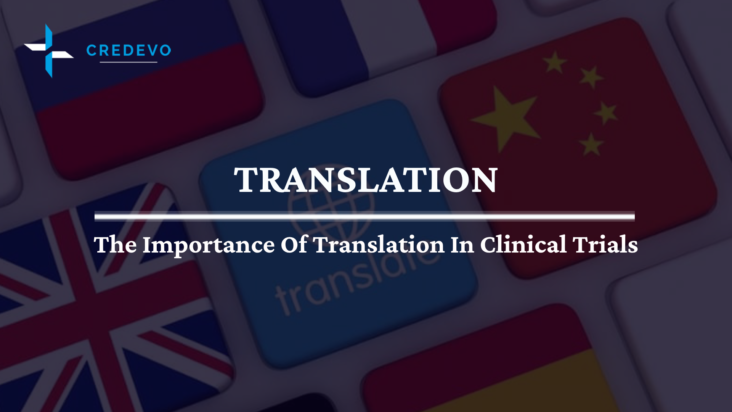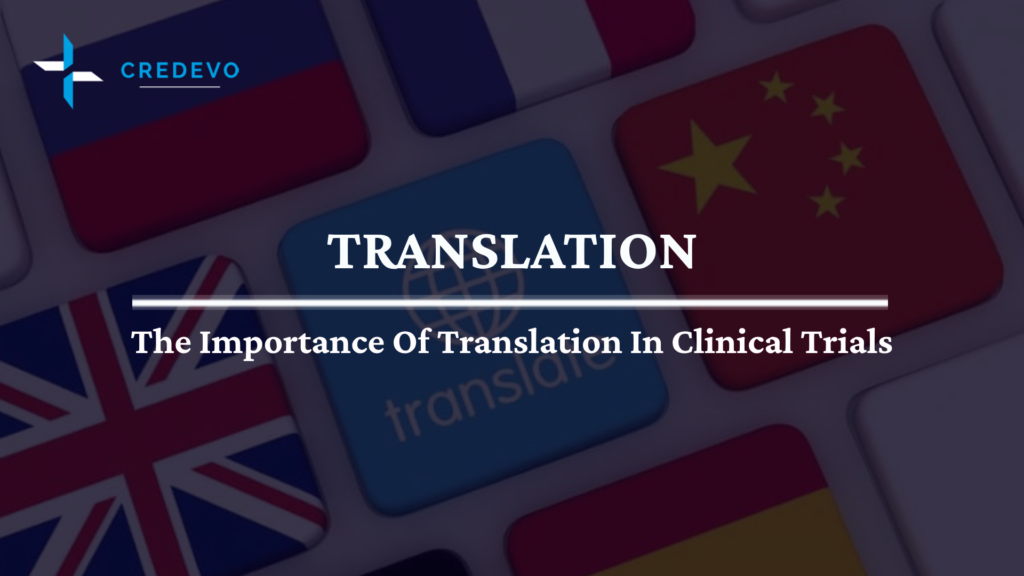The Importance Of Translation In Clinical Trials

Translation plays a crucial role in facilitating accurate communication between participants, researchers, and sponsors in conducting clinical trials on a global scale. This can be a challenging task, especially when language barriers come into play.

Clinical trials are critical for developing new drugs, medical devices, and treatments. These trials aim to test the safety, efficacy, and feasibility of new healthcare interventions before they are made available to the general public.
This article will explore the importance of translation services in clinical trials. We will explore challenges with diverse participants speaking different languages and having varied cultural backgrounds.
We will discuss the risks of inaccurate translation in clinical trials and highlight the benefits of professional translation services. Finally, we will provide best practices for translation management in clinical trials to ensure safe, ethical, and effective conduct.
Ensuring Accurate Communication in Global Clinical Trials
Accurate communication is crucial for the success and safety of global clinical trials. Participants from different countries and cultures need to be informed about the trial’s purpose, intervention, and potential risks and benefits.
Inaccurate communication can lead to serious consequences like participant dropout, compromised trial results, and jeopardized data due to misunderstandings.
- Professional translation services are essential for accurate and culturally appropriate translations, along with interpreters for face-to-face communication.
- Cultural sensitivity is also crucial as a word or phrase acceptable in one culture may be inappropriate in another.
- Professional translation services minimize misunderstandings/errors, ensuring safe, ethical, effective trials, and improved healthcare outcomes.
Overcoming Language Barriers to Informed Consent
Obtaining informed consent is critical in clinical trials, but language barriers can compromise the validity of the trial. Professional translation services ensure participants’ understanding and informed consent in their preferred language.
- This is particularly important in global clinical trials where language barriers can lead to misunderstandings and incorrect assumptions.
- Qualified translators provide accurate, clear translations of the consent form, and interpreters assist in face-to-face communication.
Do you need support in translating your documents?
Provide a brief description of your requirements in the form below to connect with us and explore our services.
The Risks of Inaccurate Translation in Clinical Trials
Accurate translation of clinical trial documentation is critical to the success of the trial. Best practices for translation involve using professional services, employing a systematic process with quality assurance measures, and subject matter expert review.
Appropriate technology and tools such as translation memory software can improve consistency and reduce time and cost. These best practices ensure accurate and consistent translation, leading to more effective clinical trials and better patient outcomes.
Translation Best Practices for Clinical Trial Documentation
Cultural appropriateness is crucial in translating clinical trial documentation for diverse participants to ensure informed consent and ethical conduct. This involves linguistically accurate and culturally sensitive translation, with plain language, community involvement, and consideration of layout and design.
Culturally Appropriate Translation for Clinical Trials
For culturally appropriate trial translation, involve culturally knowledgeable translators, review and adapt with experts and community members, use plain language, and consider layout and design. This promotes understanding, trust, and participation in clinical trials, leading to more effective and ethical research outcomes.
The Impact of Translation on Patient Recruitment and Retention
- Translation plays a crucial role in the success of multinational or multilingual clinical trials, particularly when it comes to patient recruitment and retention.
- By making trial information accessible and understandable for patients in their native language, translation services can help to build trust, promote inclusivity, and improve patient engagement.
- Additionally, accurate translations of trial materials can ensure that patients have a clear understanding of the trial’s objectives, procedures, and potential risks and benefits, leading to higher retention rates and better outcomes for the trial.
- However, it’s essential to work with experienced and qualified translation professionals to ensure high-quality translations that prevent misunderstandings and confusion, which can result in lower patient participation rates and higher dropout rates.
- By prioritizing accurate, culturally appropriate, and accessible translations, researchers can improve patient recruitment and retention rates, leading to more effective and ethical clinical trials and better outcomes for patients.
Legal and Regulatory Requirements for Translation in Clinical Trials
To comply with legal and ethical requirements, accurately translating clinical trial documentation is crucial. Legal regulations in many countries mandate the translation of documents, including informed consent forms. For example, conducting clinical trials in Japan. PMDA recommends you translate all the patient-related documents into Japanese
Accurate translation promotes participants’ understanding of risks and benefits and protects their rights and safety. When selecting a translation provider, experience with clinical trial documents and knowledge of local regulations is essential.
Addressing Challenges in Multilingual Clinical Trial Management
Multilingual clinical trials have unique challenges, including accurate and culturally appropriate translation and consistent communication. Involving translation experts from the start and using technology tools can help address these challenges.
Proper planning can also help keep the trial on track and within budget. Cultural sensitivity is also critical, and translation professionals can provide guidance on cultural nuances.
Translation Quality Control and Assurance in Clinical Trials
Ensuring the accuracy of translated clinical trial documents is critical to the success of the study. As such, translation quality control and assurance play a significant role in the process of translation for clinical trials.
Translation quality control and assurance involve several steps to ensure that the translated documents accurately reflect the original content and are culturally appropriate for the target audience. These steps include:
- Translation by a qualified professional: The translator must have a deep understanding of the source language and the target language, as well as the subject matter being translated. They should also have experience translating clinical trial documents and be familiar with the relevant regulations and guidelines.
- Review by a second translator: After the initial translation is complete, a second translator should review the translated document to ensure accuracy and consistency. The second translator should also be qualified and have experience in translating clinical trial documents.
- Cultural adaptation: It’s essential to consider cultural differences when translating documents. The translated document should be culturally appropriate for the target audience and reflect the appropriate tone and style for that culture.
- Quality assurance checks: Before finalizing the translation, it should be checked for consistency, accuracy, and completeness. Quality assurance checks can include proofreading, editing, and formatting.
- Validation: The final step in the quality control process is to validate the translated document. Validation involves comparing the original source document to the translated version to ensure that they are identical in terms of content, format, and meaning.
By implementing quality control and assurance measures, researchers can be confident that their translated clinical trial documents are accurate, culturally appropriate, and meet regulatory requirements. This, in turn, can lead to better patient recruitment and retention rates, improved study outcomes, and ultimately, better patient care.
Cost-Effective Strategies for Clinical Trial Translation Services
Managing the cost of translation services in clinical trials is crucial. Working with specialized translation service providers, using translation memory and terminology management software, and implementing quality control and assurance processes are some cost-effective strategies.
Crowdsourcing can also be an option, but it may not meet the quality standards required for clinical trials. By implementing these strategies, researchers can ensure accurate and high-quality translations while managing the overall cost of conducting clinical trials.
Conclusion
In conclusion, accurate translation of clinical trial materials is essential for clear communication with participants, compliance with legal and regulatory requirements, and promotion of ethical research practices.
- Multilingual clinical trials have unique challenges, including managing costs, coordinating with stakeholders, ensuring consistency and accuracy, and cultural sensitivity.
- Researchers can address challenges by involving translation professionals, using cost-effective strategies like specialized service providers, translation memory software, crowdsourcing, and quality control processes.
- By ensuring accurate and culturally appropriate translation of trial materials, researchers can promote effective and efficient clinical trial practices while protecting the rights and safety of trial participants.
Do you need support?
Do you have any more questions regarding the translation services? Or do you need support in translating your clinical trial or other regulatory documents from any language to any language? If so, please provide your details below, and our team will connect with you to provide the necessary support.